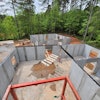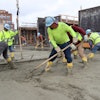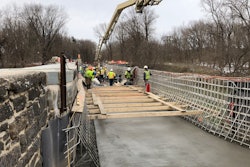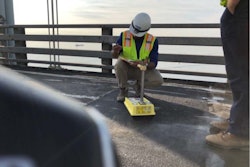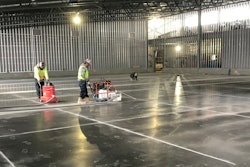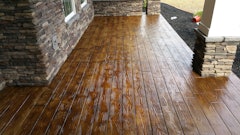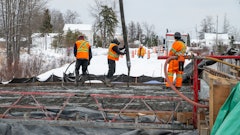
Training and certification of concrete construction personnel, especially certification through the American Concrete Institute (ACI), is on the rise. Many local, state, national, and international building codes, specifications, and agencies—along with a growing number of project owners—require certified personnel for various construction responsibilities. Certification provides assurance that quality benchmarks can be met by helping individuals gain in-depth knowledge of concrete as a material, understand proper methods and procedures for site work, and become familiar with relevant concrete codes and standards.
A key area of certification that can improve the quality of completed projects is the certification of inspectors. Inspector certification programs focus on proper procedures for inspecting various concrete installations and construction practices and identify inspectors capable of recognizing issues that require attention during each phase of a concrete construction project. To develop inspector programs, ACI committees reference codes, standards, and other documents with which an inspector should be familiar and establish a set of specific inspection responsibilities reflected in each program’s Job Task Analysis. The committees also establish certification requirements, including minimum work experience, and develop examination questions and passing score criteria.
Concrete Inspection Certifications Available Through ACI:
- Post-Installed Concrete Anchor Installation Inspection
- Concrete Construction Special Inspection
- Concrete Transportation Construction Inspection
- Nondestructive Testing
- Shotcrete Inspection
Post-Installed Concrete Anchor Installation Inspection
In 2019, ACI launched its Post-Installed Concrete Anchor Installation Inspector (PICAA) certification program. This program modified the ACI Adhesive Anchor Installation Inspector (AAII) certification program (available since 2016), expanding it to include inspection of post-installed mechanical anchors and concrete screws. The original Adhesive Anchor Installation Inspector program was launched following the Adhesive Anchor Installer program that was developed in response to a 2006 incident in a Boston interstate highway tunnel, where collapse of ceiling panels crushed a car and killed a passenger. In addition to other issues, the installation of adhesive bolt fixtures supporting the ceiling panels was implicated in the failure, calling attention to a gap in the quality chain. Industry experts realized that effective adhesive anchor installation relies on both the installer understanding and executing proper procedures, and inspectors possessing the specialized knowledge of and beyond that of the installers.
Adhesive Anchor Installation Inspector (AAII) Certification candidates are now directed to the Post-Installed Concrete Anchor Installation Inspector program for concrete anchor inspection certification. The original AAII program is no longer admitting participants.
While the immediate need was to address adhesive anchor installation inspection, ACI realized during the development of the AAII program that projects could also benefit from the inspection of post-installed mechanical anchors. Not wishing to delay the availability of the AAII program, ACI delayed incorporating inspection of mechanical anchors into the program until after the AAII program became available.
The expanded PICAA program covers all of the AAII program materials and also covers the installation of post-installed mechanical anchors. (Certification candidates are now directed to the PICAA program for concrete anchor inspection certification as the original AAII program is no longer admitting participants.)
Both the new Post-Installed Concrete Anchor Installation Inspector program and the existing Adhesive Anchor Installation Inspector program are cited in the new ACI 318-19: Building Codes Requirements for Structural Concrete and Commentary, released in June 2019.
Concrete Construction Inspection
This category encompasses Concrete Construction Special Inspector and Concrete Transportation Construction Inspector.
The number of real-world scenarios calling for construction inspectors may be wide-ranging, so ACI’s inspector program is designed to include tasks pertaining to quality control (where the inspector is employed by the contractor), code compliance (where the inspector is employed by a governmental enforcement agency) and owner acceptance (where the inspector acts on behalf of the project owner).
The Concrete Construction Special Inspector program assesses knowledge of how to inspect and record the results of concrete construction inspection based on codes and job specifications. The program covers inspection during preplacement, placement, and post-placement operations. Certified Concrete Construction Special Inspectors are identified as able to read plans, evaluate concrete conveyance, placement, consolidation, testing procedures, and inspect reinforcement placement. Special inspectors can help determine if weather or other site conditions necessitate special concreting operations and can perform post-placement inspection of curing concrete.
An Associate Concrete Construction Special Inspector qualification is also available. These associates have passed the written and plans reading examination and are knowledgeable about inspection procedures for concrete construction, including preplacement, placement, and post-placement operations, but do not have the experience required to qualify as an ACI Concrete Construction Special Inspector.
ACI’s Concrete Transportation Construction Inspector program covers knowledge specific to the construction of concrete transportation projects, including preplacement, placement, and post-placement operations. Candidates are tested in plan reading, soil-cement, piling installations, formwork installation and removal, reinforcements, embedments, sampling and testing freshly mixed concrete, conveying, placing, consolidation, finishing, jointing, curing, and protection.
Candidates may also be designated as Concrete Transportation Construction Inspectors-in-Training. These individuals have demonstrated knowledge in concrete inspection methods for transportation projects by passing the written and plans reading examinations, but do not have the experience required to qualify as an ACI Concrete Transportation Construction Inspector.
Already Have Grade I Certification or Certification Expired?
Associate Concrete Construction Special Inspector and Concrete Transportation Construction Inspector-in-Training certifications are available to persons possessing ACI Field Testing Technician – Grade I certification.
Concrete Construction Special Inspector and Concrete Transportation Construction Inspector certifications are available to persons possessing ACI Concrete Field Testing Technician – Grade I certification and who meet requirements for education and/or work experience.
Persons whose ACI Concrete Field Testing certification has expired may be eligible to certify as inspectors if they pass the current ACI Concrete Field Testing Technician—Grade I written exam within one year of passing the Inspector exam.
To complete an inspector program and achieve certification, participants must obtain a passing grade on a written examination as well as a plans-reading examination.
Nondestructive Testing
Introduced in 2020, the Nondestructive Testing program identifies specialists who understand and have the skill to use the tools and test methods associated with determining the in-place strength of concrete. In addition to being used to investigate existing conditions in a concrete structure, nondestructive tests are used to ensure that specifications are being met during construction.
The goal of the program is to promote consistency throughout the industry, with all personnel adhering to ASTM standards including those governing pulse velocity through concrete, penetration resistance of hardened concrete, rebound number of hardened concrete, compressive strength of concrete cylinders cast in place in cylindrical molds, pull-out strength of hardened concrete, and the estimating concrete strength by maturity method. Program participants typically use their own equipment to conduct performance evaluations that are required as part of the course, so the skills proven during examination are applicable to the real-world conditions the candidate will encounter on the job.
Shotcrete Inspection
With the use of shotcrete increasing in many construction projects, ACI introduced its Shotcrete Inspection program in 2020.
Inspectors of shotcreting operations must understand the responsibilities and qualification requirements of the nozzleman as well as the inspection requirements as cited in the documents governing the construction of the project.
Topics covered in the ACI Shotcrete Inspection program include:
- Safety guidelines
- Hot- and cold-weather concreting
- Fiber-reinforced shotcrete
- Shotcrete specifications
- Standard practice for preparing and testing specimens from shotcrete test panels
- Standard test method for obtaining and testing drilled cores of shotcrete
- Visual core quality evaluation, and
- Other relevant evaluation methods
The program is open to persons who hold a ACI Field Testing Technician – Grade I certification and who meet requirements for education and/or work experience. (Persons whose ACI Concrete Field-Testing certification has expired may be eligible to certify as inspectors if they pass the current ACI Concrete Field Testing Technician—Grade I written exam within one year of passing the Inspector exam.) Satisfactory work experience must include at least one of the following: testing, inspection, and quality control of shotcrete; supervision of shotcrete construction work; and design of shotcrete structures. Verification of the amount and range of work experience by the applicant's employer(s) is required.
All ACI inspector certifications are valid for five years from the date of successful completion of requirements. As with other ACI certification programs, inspector programs are offered through ACI Chapter and Non-Chapter Sponsoring Groups who offer the programs within their communities. By identifying qualified individuals responsible for inspecting concrete, ACI inspector programs add another level of quality assurance to the construction environment.
For more information, visit concrete.org.
About the authors
Michael Morrison is the manager of program development at the American Concrete Institute.
John W. Nehasil is the managing director of certification at the American Concrete Institute.

